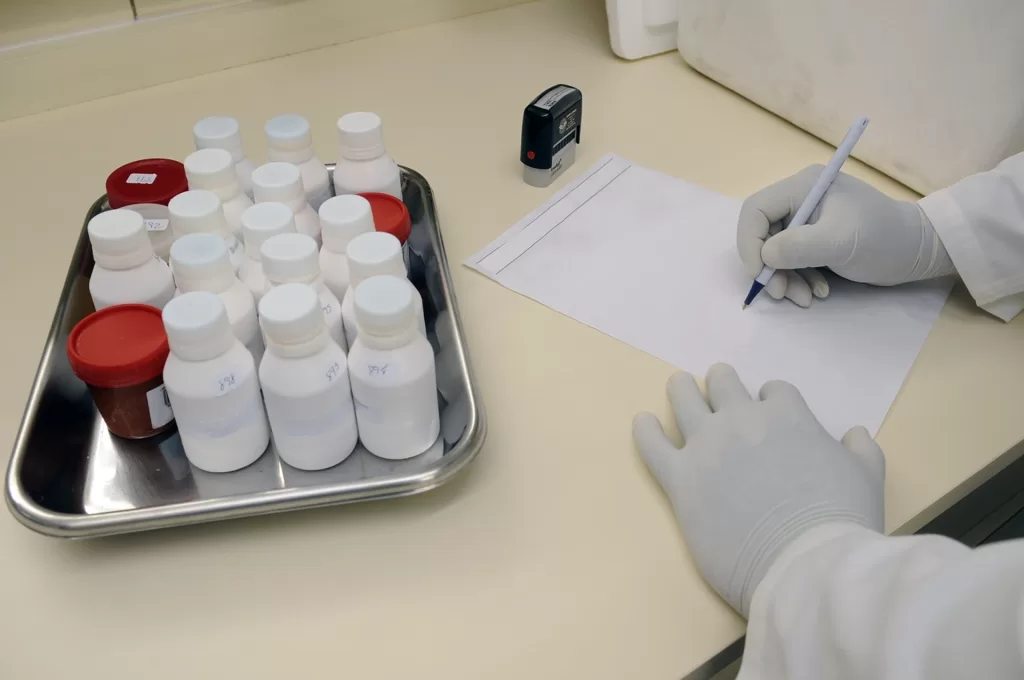Research on NAD+ and Cancer: What We Know So Far
08/21/2023

Hear ye, hear ye! Gather 'round all you curious souls, for we are about to embark on a journey into the mysterious world of NAD+ and its intriguing relationship with cancer. In this article, we will uncover the secrets hidden within the realms of biochemistry, cellular functions, and the exciting field of cancer research. So tighten your seatbelts and get ready for a wild ride!

Understanding NAD+ and Its Biological Role
First things first, let's get acquainted with NAD+. So, what exactly is this little molecular maestro? Well, NAD+ is short for Nicotinamide Adenine Dinucleotide, and it plays a crucial role in the biochemical processes of our cells. You might think of it as a cellular multitasker, juggling various responsibilities to keep our bodies functioning like well-oiled machines.
Now, let's dive into the marvelous world of biochemistry and explore the intricate dance of NAD+. This tiny molecule is involved in numerous cellular functions, and it's like the conductor of an orchestra, orchestrating the symphony of life. From energy production to DNA repair, NAD+ is the maestro that ensures everything runs smoothly and harmoniously.
One of the key roles of NAD+ is its involvement in cellular respiration, the process by which cells convert nutrients into energy. NAD+ acts as a coenzyme, facilitating the transfer of electrons during the breakdown of glucose and other molecules. This electron transfer is essential for the production of ATP, the energy currency of the cell. Without NAD+, our cells would struggle to generate the energy needed to carry out their vital functions.
But NAD+ doesn't stop at energy production. It also plays a critical role in DNA repair. Our DNA is constantly under attack from various sources, such as radiation and chemical agents. These assaults can cause damage to our DNA strands, leading to mutations and potentially harmful consequences. However, NAD+ comes to the rescue by activating enzymes called sirtuins, which are involved in DNA repair processes. By supporting DNA repair, NAD+ helps maintain the integrity of our genetic material and prevents the accumulation of harmful mutations.
In addition to its role in energy production and DNA repair, NAD+ is also involved in regulating various cellular processes, such as gene expression and cell signaling. It acts as a cofactor for enzymes involved in these processes, helping to fine-tune their activity and ensure proper cellular function.
Furthermore, NAD+ has been linked to aging and age-related diseases. As we age, the levels of NAD+ in our cells decline, which can have detrimental effects on cellular function. This decline in NAD+ has been associated with a decrease in mitochondrial function, increased oxidative stress, and impaired DNA repair. Researchers are actively studying ways to boost NAD+ levels in the body, with the hope of potentially slowing down the aging process and preventing age-related diseases.
In conclusion, NAD+ is a remarkable molecule that plays a vital role in the intricate web of biochemical processes within our cells. From energy production to DNA repair and beyond, NAD+ is the conductor that ensures the symphony of life plays on. Understanding the functions and importance of NAD+ not only expands our knowledge of biology but also opens up new avenues for research and potential therapeutic interventions.
The Connection Between NAD+ and Cancer
Ah, cancer! The word itself sends shivers down our spines, evoking images of a formidable opponent that has plagued humanity for centuries. But fear not, intrepid explorers, for we shall unravel the enigmatic connection between NAD+ and cancer.
Let us delve deeper into the intricate web that links NAD+ and cancer. Picture this: cancer cells are like rebellious outlaws, hijacking the normal metabolic pathways of our bodies for their own twisted purposes. And guess what? NAD+ has a starring role in this biochemical heist. Research has revealed that altered NAD+ metabolism is a hallmark of cancer cells, aiding their survival and growth. By manipulating these metabolic pathways, cancer cells harness the power of NAD+ to fuel their relentless expansion.
But that's not all. NAD+ continues to play a pivotal role in tumor progression. As if cancer cells weren't audacious enough, NAD+ steps onto the stage once again, playing the role of an evil henchman enabling the villainous tumor to spread its nefarious influence. It's like a dark partnership, where NAD+ supports cancer progression by promoting angiogenesis (the formation of new blood vessels) and assisting cancer cells in evading the immune system, allowing them to spread their wickedness far and wide.
Now, let's take a closer look at how NAD+ fuels the growth and survival of cancer cells. Within the intricate machinery of our cells, NAD+ acts as a vital coenzyme, participating in numerous metabolic reactions. It serves as a key player in cellular energy production, facilitating the conversion of nutrients into usable energy. In cancer cells, this energy production process goes awry, leading to a dysregulated metabolism that fuels their uncontrolled growth.
Furthermore, NAD+ plays a crucial role in maintaining the delicate balance between cell death and survival. In healthy cells, NAD+ helps regulate programmed cell death, known as apoptosis, ensuring that damaged or abnormal cells are eliminated. However, in cancer cells, this balance is disrupted, allowing them to evade apoptosis and continue proliferating.
But the story doesn't end there. NAD+ also influences the intricate dance between cancer cells and the immune system. Our immune system is designed to detect and eliminate abnormal cells, including cancer cells. However, cancer cells have developed cunning strategies to evade immune surveillance. And once again, NAD+ comes into play. It assists cancer cells in evading the immune system's watchful eyes, allowing them to cloak themselves in a protective shield and continue their destructive journey.
So, as we unravel the connection between NAD+ and cancer, we find ourselves in awe of the complex interplay between these two entities. NAD+ acts as both a fuel source for cancer cells and an enabler of their progression, supporting their survival, growth, and ability to evade the immune system. Understanding this intricate relationship opens up new avenues for developing targeted therapies that aim to disrupt the partnership between NAD+ and cancer, offering hope in the battle against this formidable foe.
Current Research on NAD+ and Cancer
Now that we've scratched the surface of this captivating topic, let's delve into the realm of cutting-edge research and explore the latest findings surrounding NAD+ and its relationship with cancer.
But first, let's take a step back and understand the significance of NAD+ in our bodies. Nicotinamide adenine dinucleotide (NAD+) is a coenzyme found in all living cells. It plays a crucial role in various cellular processes, including energy metabolism, DNA repair, and gene expression. Without NAD+, our cells would struggle to function properly.
Now, let's get back to the exciting world of NAD+ and cancer research.
Recent Findings on NAD+ and Cancer
Breaking news, folks! Scientists have been hard at work unraveling the mysteries of NAD+ and cancer. Recent studies have shown that manipulating NAD+ metabolism holds promise as a potential therapeutic strategy. By targeting the metabolic vulnerabilities of cancer cells, researchers hope to develop innovative treatments that strike at the heart of the cancer beast.
One fascinating finding is that cancer cells often exhibit altered NAD+ metabolism compared to normal cells. This alteration can lead to a dysregulated cellular environment that promotes tumor growth and survival. Researchers are now exploring ways to exploit these metabolic differences to develop targeted therapies.
Furthermore, studies have revealed that NAD+ levels can influence the effectiveness of certain cancer treatments. For example, some chemotherapy drugs rely on NAD+ to exert their cytotoxic effects on cancer cells. By understanding the intricate relationship between NAD+ and chemotherapy, scientists can optimize treatment regimens and potentially enhance patient outcomes.
Excitingly, researchers have also discovered that NAD+ plays a role in the immune response against cancer. It has been found that boosting NAD+ levels can enhance the anti-tumor activity of immune cells, potentially leading to more effective immunotherapies.
Ongoing Studies and Their Implications
The quest for knowledge never ceases, and neither does the pursuit of groundbreaking cancer research. Ongoing studies are further exploring the intricate relationship between NAD+ and cancer, shedding light on potential biomarkers, therapeutic targets, and novel treatment approaches.
Scientists are investigating the role of NAD+ in different types of cancer, such as breast, lung, and colon cancer, to uncover specific mechanisms that drive tumor progression. By identifying these mechanisms, researchers can develop targeted therapies tailored to each cancer type, improving treatment outcomes and patient survival rates.
Moreover, ongoing studies are exploring the potential of NAD+ as a biomarker for cancer diagnosis and prognosis. By analyzing NAD+ levels in patient samples, scientists aim to develop non-invasive tests that can detect cancer at early stages and predict treatment response.
The implications of these studies are far-reaching, holding the key to a future where cancer might no longer cast its dark shadow. The hope is that by understanding the intricate relationship between NAD+ and cancer, scientists can unlock new avenues for treatment, ultimately leading to improved patient outcomes and a world free from the burden of cancer.
Potential Therapeutic Applications of NAD+ in Cancer
Now that we've glimpsed the extraordinary potential hidden within this tangled web of biology, let's ponder the potential therapeutic applications of NAD+ in cancer treatment.
NAD+ Boosting Strategies in Cancer Treatment
Can NAD+ be the knight in shining armor, swooping in to rescue us from the clutches of cancer? Researchers are exploring ingenious ways to boost NAD+ levels and tip the scales in our favor. From developing NAD+ precursors to designing novel drug delivery systems, these strategies hold the promise of revolutionizing cancer treatment. The battle against cancer might just have found its unlikely hero.
Challenges and Future Directions in NAD+ Cancer Therapy
As with any great quest, challenges lie along the path to victory. Researchers face hurdles and obstacles as they navigate the intricate landscape of NAD+ cancer therapy. From deciphering the complexities of NAD+ metabolism to addressing potential side effects, the road ahead is paved with challenges. Yet, the indomitable spirit of scientific inquiry keeps hope alive, leading us ever closer to conquering the cancer dragon.
Conclusion: The Future of NAD+ and Cancer Research
As we reach the finale of our grand adventure, let us take a moment to summarize the current state of knowledge and peer into the crystal ball to glimpse the future of NAD+ and cancer research.

Summarizing the Current State of Knowledge
In our quest for understanding, we have unraveled the deep interplay between NAD+ and cancer. From its crucial role in cellular functions to its involvement in cancer cell metabolism and tumor progression, NAD+ has shown its dark and light sides. The current state of knowledge provides a solid foundation for future breakthroughs in this captivating field.
Looking Ahead: Potential Breakthroughs and Challenges
The future is brimming with possibilities, my curious comrades! Potential breakthroughs await, tantalizing us with visions of personalized NAD+ therapies and an arsenal of potent anti-cancer weapons. However, challenges loom on the horizon, requiring collaboration, dedication, and unwavering determination to overcome. The journey continues, and with each step forward, we move closer to a future where cancer's reign is but a distant memory.
And there you have it, fellow adventurers! We have sailed through the vast sea of knowledge surrounding NAD+ and its fascinating relationship with cancer. Although the journey may continue, armed with the knowledge we have gained, we stand united in our quest to conquer cancer and usher in a brighter future.

 Back to Blog
Back to Blog